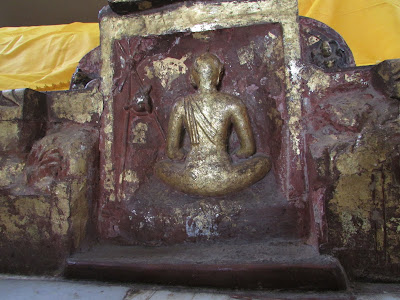Kushinagar is one of the four holy
places of Buddhists, and is town of Uttar Pradesh State in Indian country. In the epic poem of India (Ramayana), Kushwati
was capital of Kosala kingdom which was built by king Kush. In the Buddhist tradition,
there was a lot of Kush grass in Kushawati, and which also named of the
previous king in the ancient Indian country. The Buddha had chosen Kushinagar
to pass away with three reasons: Kushinagar was the proper venue for teaching
the Mahāsudassana Sūtra; the Buddha needed to give teaching for the last disciple
named “Subhadda”; there was a wise Brahmin called Doha who could meditate among
all disciples and Kings, and one would inevitably argue on how to share the
Buddha’s relics.
Siddhārtha Gautama Buddha passed
into Parinirvāṇa at the age 80s. The Buddha gave teaching at the Vulture’s peak
of Rajgir, Vaishali, and then he went to Cunda or Kunda who gave the last meal
as an offering to the Awakened One. The Buddha fallen into the violently ill after
eating that meal, he thus instructed his attendant Ānanda to convince Cunda
that, “the meal eaten at his place had nothing to do with his passing and that
his meal would be a source of the greatest merit as it provided the last meal
for a Buddha.” It quotes in the Mahaparinibbāna Sutta of Dīgha Nikāya 16 with
the Verse 56.
Kushinagar was a city in the 12th
century AD, and was thereafter lost into oblivion. In the 19th
century AD, the Archeological excavations carried out by Alexander Cunningham
through the first Archaeological Survey of India. Nowadays, Kushinagar now is
the solemn place in the Spiritual Indian country in the general, and for Buddhists
in over the world.













































No comments:
Post a Comment